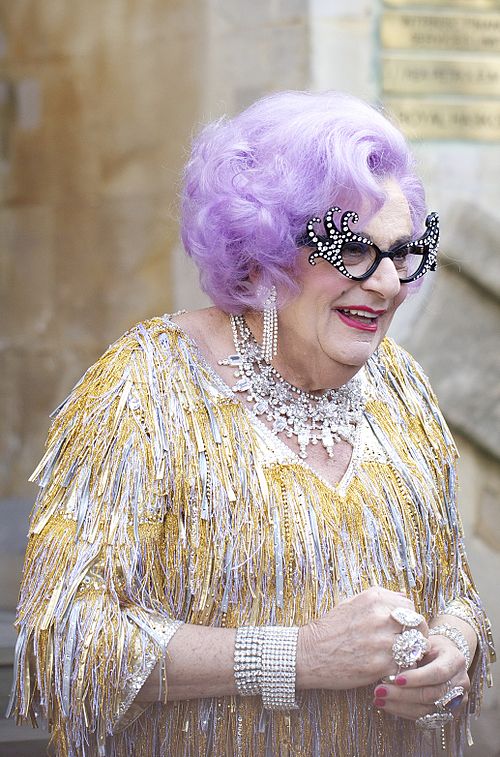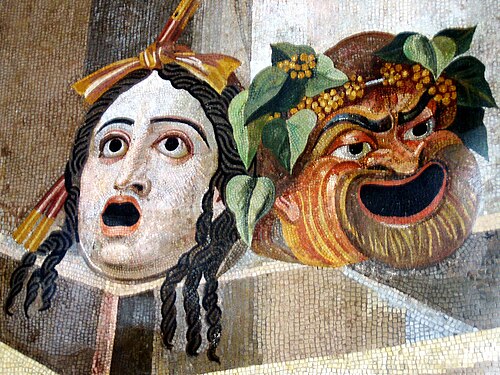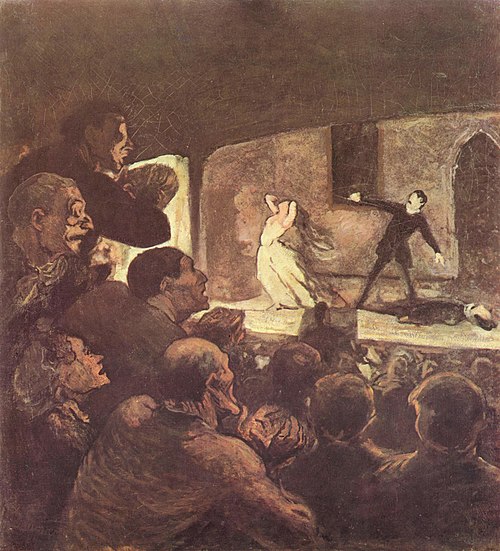Comedynoun
A choric song of celebration or revel, especially in Ancient Greece.
Comedynoun
(countable) A light, amusing play with a happy ending.
Comedynoun
A narrative poem with an agreeable ending (e.g., The Divine Comedy).
Comedynoun
A dramatic work that is light and humorous or satirical in tone.
Comedynoun
(drama) The genre of such works.
Comedynoun
(uncountable) Entertainment composed of jokes, satire, or humorous performance.
Comedynoun
The art of composing comedy.
Comedynoun
(countable) A humorous event.
Comedynoun
A dramatic composition, or representation of a bright and amusing character, based upon the foibles of individuals, the manners of society, or the ludicrous events or accidents of life; a play in which mirth predominates and the termination of the plot is happy; - opposed to tragedy.
Comedynoun
light and humorous drama with a happy ending
Comedynoun
a comic incident or series of incidents
Comedynoun
professional entertainment consisting of jokes and sketches, intended to make an audience laugh
Comedynoun
a film, play, or broadcast programme intended to make an audience laugh
Comedynoun
the style or genre represented by comedy films, plays, and broadcast programmes
Comedynoun
the humorous or amusing aspects of something
Comedynoun
a play characterized by its humorous or satirical tone and its depiction of amusing people or incidents, in which the characters ultimately triumph over adversity
Comedynoun
the dramatic genre represented by comedies
Comedy
Comedy (from the Greek: κωμῳδία, kōmōdía) is a genre of fiction comprised of discourses or works intended to be humorous or amusing by inducing laughter, especially in theatre, film, stand-up comedy, television, radio, books, or any other entertainment medium. The term originated in Ancient Greece: in Athenian democracy, the public opinion of voters was influenced by political satire performed by comic poets in theaters.
Melodramanoun
A kind of drama having a musical accompaniment to intensify the effect of certain scenes.
Melodramanoun
(countable) A drama abounding in romantic sentiment and agonizing situations, with a musical accompaniment only in parts which are especially thrilling or pathetic. In opera, a passage in which the orchestra plays a somewhat descriptive accompaniment, while the actor speaks
Melodramanoun
Any situation or action which is blown out of proportion.
Melodramanoun
Formerly, a kind of drama having a musical accompaniment to intensify the effect of certain scenes. Now, a drama abounding in romantic sentiment and agonizing situations, with a musical accompaniment only in parts which are especially thrilling or pathetic. In opera, a passage in which the orchestra plays a somewhat descriptive accompaniment, while the actor speaks; as, the melodrama in the gravedigging scene of Beethoven's "Fidelio".
Melodramanoun
an extravagant comedy in which action is more salient than characterization
Melodrama
In modern usage, a melodrama is a dramatic work wherein the plot, which is typically sensational and designed to appeal strongly to the emotions, takes precedence over detailed characterization. Melodramas typically concentrate on dialogue, which is often bombastic or excessively sentimental, rather than action.





















